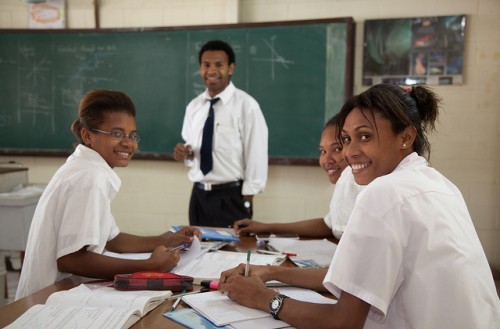Image: Students at a secondary school in PNG (Ness Kerton/DFAT).
In October 2015 I met Anna, a softly spoken young woman who lives in Port Moresby, Papua New Guinea (PNG). We talked during the recess break at school and Anna told me about some of the challenges she faces trying to complete year ten, the final year of compulsory education in PNG. These include that she is beaten by her aunt and grandmother, they refuse her the bus money to get to school and that her aunt recently set fire to her text books.
Anna’s mother died when she was six, and then her father abandoned her to live with his second wife in another province of PNG. For the last ten years, Anna has been at the mercy of her father’s abusive relatives who perceive her desire to gain an education as evidence that she has aspirations beyond her status. Education is free in PNG, but they resent having to provide for her. Because Anna has nowhere safe to live, she is at risk of dropping out to earn a living on the streets.
But there is hope. I met Anna through Elizabeth, a teacher at Anna’s school who is a member of the Port Moresby chapter of the International Federation of Business and Professional Women (BPW). When she was young, Elizabeth also had difficulty completing her education, partly because she comes from a large family where the priority was educating boys, as is common in PNG. Now Elizabeth supports young women like Anna, helping them to complete their education often against all odds.
BPW International, founded by lawyer Dr Lena Madesin Phillips in 1930, is a network of business and professional women that has affiliates in eighty countries in five continents. Its members include influential women leaders, entrepreneurs, business owners, executives, professionals and young career women. It describes itself as an organisation that ‘contributes to society by enabling women to sustain themselves economically’ and ‘through personal development’.
I was able to see what this means on the ground when, after our conversation with Anna, Elizabeth met with Judith Bona, a long-term member and a former President of Port Moresby’s BPW. Bona promised that BPW would provide the necessary funding to find Anna safe and peaceful housing in the city.
Later, when I was able to ask Bona about this and other aspects of BPW’s work, she said that the group’s capacity to meet needs as they arise is an advantage of their local connectedness. This ‘local-ness’ makes it possible for them to find the right solution to make concrete the International Federation’s aim of ‘creating a nurturing environment in work, education, health for women’s development’. From a distance, it would be difficult to predict that a safe place to live might, in fact, be a young woman’s most pressing educational need.
“We’re not fixed about what you can and can’t do,” said Bona. This means that BPW is recognised in PNG as ‘an organisation that has its finger on a need in the community’, and its members’ long term commitment to supporting girls and women as they complete their education has earned much respect during the 35 years they have been doing this work.
The Port Moresby chapter of BPW was established in 1982 by Carol Kidu (now Dame Carol Kidu), the Australian-born PNG politician who was the only female Member of Parliament between 2002 and 2012. She served as Minister for Community Development for almost a decade, and then as Opposition Leader from February 2012 until her retirement from politics later that year. She became known for her passionate campaigning on poverty alleviation, against domestic violence and child abuse, and for the empowerment of women.
But at the time she set up the BPW in Port Moresby, Kidu was a teacher and a writer of school textbooks who had seen at first hand the need to actively promote the education of PNG’s girls and young women. She brought women together in the BPW to establish the now highly-respected scholarship program for girls. At the time, most of the participants were expatriate women who, to raise money, did everything from ‘baking cakes and running art shows’. Their overarching aim, however, was radical in the context of PNG – the empowerment of women through education.
Since then, the organisation has grown to include hundreds of professional Papua New Guinean women, all volunteers. Some are themselves former BPW scholars. A number, including the current club President Susil Nelson, are well-connected with corporate sponsors and this means that BPW has been able to step up its support for the education of girls and women.
I was impressed by many aspects of Port Moresby’s BPW, but I was struck by two things above all. The first is the organisation’s inclusivity – it could so easily be a top-down initiative to provide for ‘those less fortunate’, but instead it asks all scholarship recipients past and present to attend meetings and contribute to the life of the club. This includes the effort that goes into face-to-face contact with the girls and young women who receive the club’s help.
And secondly, in an age when large donor organisations can be all too willing to ‘throw money’ at local success stories, BPW has refused to accept such support. Its ethos is that it has a moral responsibility to deliver funds sustainably while maintaining control over decision-making.
The group’s work, and the experiences of Anna and the other students helped by them, offer fascinating insights for my current research. Business-like and professional, BPW Port Moresby is an impressive example of local women networking to advance gender equity and contribute to positive, sustainable change in their communities.
The work of the Port Moresby branch of the BPW is one of two case studies for Dr Ceridwen Spark’s DLP-funded research project on women’s activism through coalitions in Papua New Guinea and Malaysia. Publication of the final research paper is expected in Autumn 2016.










